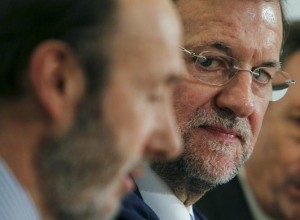The Spanish prime minister’s announcement that general elections will be held on November 20 rather than in the spring, as previously scheduled, was not altogether surprising. Pressure had been mounting on him for weeks to bring the date forward, especially from the opposition and the right-wing media.

Another factor is Spanish voters, who rightly see Zapatero as a lame duck leader, especially since stepping aside to let Alfredo Pérez Rubalcaba become Socialist candidate.
But there was also pressure from within Zapatero’s own party to hold an autumn election, including from Rubalcaba himself. The former interior minister was concerned that any momentum his nomination as candidate may have given the Socialists would be exhausted by the spring. A November vote, however, gives him enough time to organise his campaign and execute it without running out of steam.
Shunning the spring option assumes that the economy will not have turned around enough by then (or at all) to give the Socialists an advantage. It also means Zapatero can sidestep the trauma of building congressional support for the 2012 budget.
This all adds up to powerful argument in favour of Zapatero’s decision, from his party’s point of view. But having pressed for an early election throughout this year, the opposition Popular Party (PP) can also argue it benefits from this decision.
PP leader Mariano Rajoy has focused his opposition strategy on Spain’s economic woes. Refusing to support government austerity plans or offer a detailed plan of his own, he has allowed Zapatero to dig his own hole. Europe’s highest unemployment rate has done Rajoy’s work for him, burying the economic credibility of the government.
But it’s a strategy that can only last so long. Rajoy agitated for an early date because he feared another six or seven months of keeping his head down and avoiding specifics would start costing him in the polls.
So with both main parties fretting that post-Christmas burn-out would hurt them in an election, who was right?
The bailout threat
A closer look at the “Rubalcaba factor” argument – which presents the Socialist candidate as a secret weapon whose political nous will see him cut into the PP lead – shows it to be somewhat exaggerated. According to Metroscopia polling firm, the PP’s lead is still 14 points – unchanged since Rubalcaba’s unveiling as candidate. Rajoy’s ploy of going to the vote as soon as possible to avoid spooking voters and cashing in on his party’s current poll lead looks more watertight.
If the Socialists manage somehow to ensure the campaign does not focus exclusively on the economy, they might do some damage to the PP. Right now, that looks an extremely tall order. Even if Spain can ward off current EU bailout speculation, the country is going to have to fend off such panic at least until November 20, making the economy the only obvious talking point.
And the more the interest on Spain’s debt spirals out of control over the summer and autumn, the more likely Rajoy can be assured of strolling into Moncloa prime minister’s residence in the winter. Once there though, he might not see the task ahead of him as quite so appealing.
The real question is whether or not the PP will govern with an absolute or only with a relative majority in Parliament. And what one and the other possibility would mean for Spain. Actually, the second possibility can be split into two, or even three scenarios: Would the PP’s minority government have to rely on case by case arrangements with regional nationalists, would it rely on such arrangements with any party, including the socialists, or would we see something like a grand coalition of PP and PSOE?
Interesting times.
Early elections will be a step behins for Spain
It will permit a sort of desktop cup, every time the opposition are looking for an opportunity to take the govermment management.
It will be a hard hit or a down hit to democracy